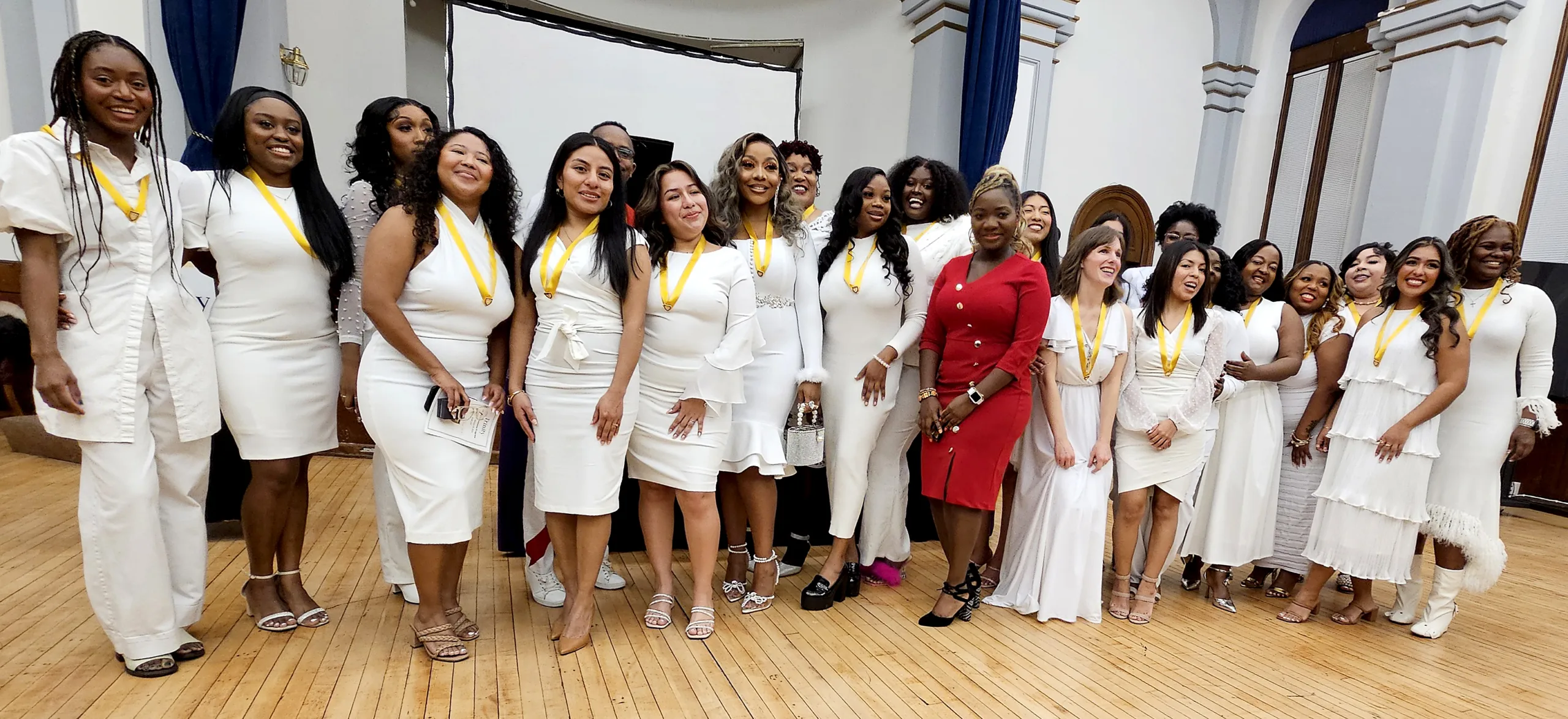End the Gaza Horror. Now!
April 7, 2024
(view of Gaza ruins, photo credit)
Six months ago, on October 7, 2023, Hamas terrorists committed horrific attacks on Israeli people, resulting in about 1200 Israeli deaths. Among other murderous acts, the attacks included bombs from drones and terrorists on motorcycles shooting Israelis at a music festival. Hamas also took hostages, many of whom continue to be held in unknown places, possibly in deep underground tunnels.
Declaring its right to defend itself, Israel launched an immediate military offensive in the Hamas-controlled Gaza Strip, home to several million Palestinians. As an ally of Israel since the formation of that nation after World War II, the United States declared support for Israel, and many Americans (including me) also declared support for our ally that also is the spiritual home of the Jewish people who have suffered so much oppression and real devastation across the millennia. Palestinians and their supporters were outraged by the U.S. support for Israel, and protests continue to this day on college campuses, in cities, at major events, even at the Oscars.
Now, six months later, the appalling toll of Israel’s war in Gaza has become a moral catastrophe. Gaza is in ruins. Hospitals destroyed, homes obliterated, cities reduced to rubble. More than 30,000 Palestinians are dead, and the threat of famine and disease rises each day. Last week, in what it said was a “mistake,” Israel killed 7 members of the World Central Kitchen humanitarian food relief effort. (Read Chef Jose Andres powerful essay on the tragedy.)
Modern warfare has the intelligence and tools to avoid such a “mistake” if the leaders care enough about protecting civilians to exercise prudence. Israeli Prime Minister Benjamin Netanyahu demonstrates each day a stunning disregard for civilians and utter contempt for the idea of proportionality in pursuing his vengeful campaign in Gaza.
“Just war” is a moral concept found in many faith teachings and even in military rules. What is going on in Gaza has gone well beyond any conceivable notion of a “just war.” At the beginning Israel had a right to defend itself, but its leadership has allowed the war to become a global scandal of revenge and retribution against tens of thousands of innocent people. It does not diminish our concern for the oppression and devastation the Jewish people have suffered across the millennia to say that Palestinians, too, have suffered oppression and horrific violence. The ancient “eye for an eye” philosophy of vengeance has resulted in oceans of blood and sorrow with little permanent resolution in sight.
President Biden and the United States must do more to stop the bloodshed, including ending financial and weapons support for Israel. Our leaders should stop thinking about political calculus in this election year and instead focus on the core moral concerns about a war that has gone out of control. Pope Francis has called for an immediate cease fire and he is right. We cannot possibly say we want Netanyahu to move toward peace when we send him more bombs. Our actions must back up the rhetoric of seeking peace.
Statement of World Central Kitchen
Timeline of Key Moments in the Israel-Gaza War (Washington Post)
Continue reading →Read comments (0) Add CommentHappy Spring Break!
March 6, 2024Even if Florida is not in your Spring Break plans, you can enjoy a bit of the Everglades with this 90 second video of some of the beautiful wild things there….
I was on a business trip to Florida at the end of February, meeting with alumnae and going to a board meeting. I did manage to escape into the Everglades with my camera for about three hours one day and the wild things did not disappoint! Enjoy!!
PS — on a more serious note, this essay about the death of the owl Flaco in New York City and the perils of human interaction with wildlife is a beautiful read and makes some very important points about the limits of development in wild habitat. Florida is a case study in how human intervention in the wild landscape has created so many environmental problems for the wild creatures and humans alike.
Continue reading →Read comments (0) Add CommentWhat’s On The Menu?
February 26, 2024Who knew that deli sandwiches could generate so much controversy? I’m not talking about the regional hoagie v. sub v. grinder, or the ever present debate on mayo-mustard-olive oil. The controversy in question was not really about food at all, although a Black History Month menu from Dining Services triggered the difficult, fascinating, honest discussion of racial and ethnic cultural mis-appropriation, stereotypes, microaggressions and respect for those who work hard to nourish the rest of us. I put the controversy on the agenda for last week’s Campus Conversations and the discussion was honest, courageous, and, for some, vexing.
At a time when Black history is being eradicated by governors and state legislatures all over the country, we should work harder to get it right at Trinity. I wanted to have the discussion on Campus Conversations so that we could lift up our concerns, differences of opinion, and issues that sometime stay repressed when we have to be more open about them. We have an obligation to live our mission in social justice honestly and authentically, and when a concern arises about racial equity and justice, we need to address it.
Jumping to the end, what I heard loud and clear is that we should be more intentional, authentic and pro-active about providing a context for any and all activities we promote for Black History Month or any and all of the other “Month” observances — Women’s History, Hispanic Heritage, LGBTQ+, and others. Going forward, I would like to invite members of the campus community to engage in processes to plan the programs, menus, communications and all relevant dimensions of such observances.
Back to the beginning. While I don’t want to re-ignite the controversy, this image of the menu is important for the subsequent discussion:
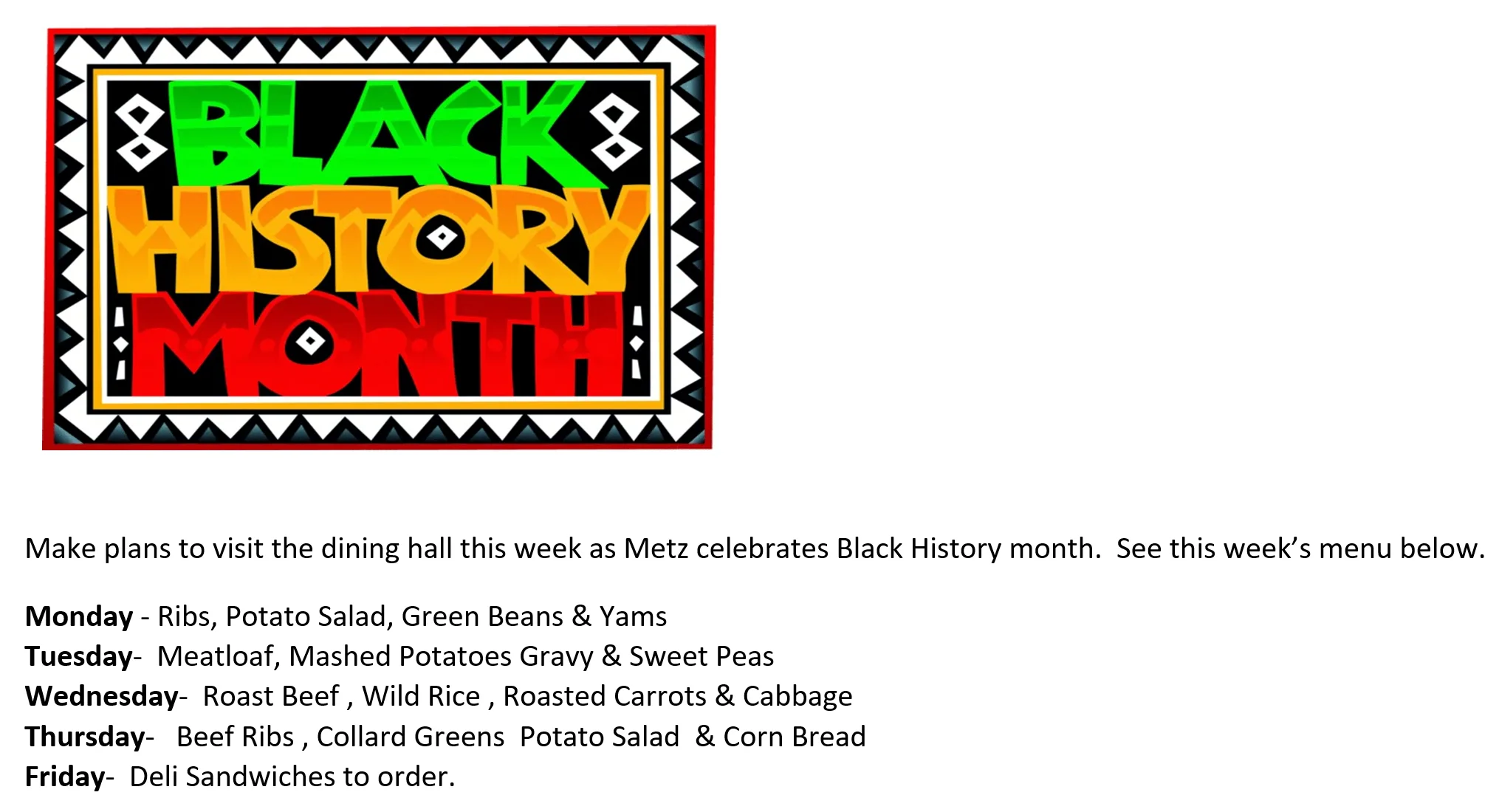
While the Deli Sandwiches are clearly out of place — Director of Dining Services Gilles Syglowski later explained that the sandwiches are part of the regular weekly menu and probably should not have appeared on this “special” menu — the rest of the menu appeared as delicious and even ambitious. Chef Renee Fitzgerald created the menu based on her own experience with Southern and Black cuisine, and she is proud of her work. We are all very grateful to Chef Renee and her team in the kitchen for their hard work every single day!
As the conversation unfolded during Campus Conversations, it became clear that the controversy was not really about the food at all — students in particular commented about how much they enjoyed it — but rather, about how we tell the story, who has the right and responsibility to tell the story, what is the story we are trying to tell and what racial/ethnic/cultural symbols and experiences do we use to “celebrate” or observe a heritage that is rife with pain and suffering and pride and triumph.
The menu was not really the problem at all, but rather, we failed to tell the story about what the menu represented. We failed to be good teachers in a moment that cries out for courageous instruction. We did not educate our students and campus community about the importance and symbolism of food as a vital dimension of the Black community’s response to centuries of oppression. We missed a “teachable moment” but created another one that is even more valuable in the long run.
Annette Coram, executive director of Conference Services, sent out the menu on behalf of Metz Dining Services and she was stunned by some of the criticism that ensued. Annette gave a statement during Campus Conversations that was excellent —- the missing context for the menu! With her permission, I am sharing her statement here because it is a powerful explanation of the menu, and a great example of how we should be more intentional and authentic as we plan our future heritage observances:
Statement of Annette Coram on the Black History Month Menu
Good afternoon- I am Annette Coram, author of said email about the Black History menu offered by Metz dining services.
I would be remiss if I didn’t add my comments to this upsetting and troubling discussion.
I have to start out by saying I am both disappointed and confused at the response to the email about a Black History Month Menu.
For those unaware, the menu shared with all Trinity was curated by our dining hall chef, Renee Fitzgerald—an African American native from North Carolina who was raised in Washington, DC. The menu presented featured food offerings such as Ribs, Potato Salad, Green Beans & Yams, Meatloaf, Mashed Potatoes Gravy & Sweet Peas, Roast Beef, Wild Rice, Roasted Carrots & Cabbage Beef Ribs, Collard Greens Potato Salad & Corn Bread—types of food that would be termed traditional Soul food.
Now, I know we have many educated people on this call so I will not delve into how one creates and illustrates culture but let it suffice to say culture is universally experienced through a people’s customs, clothing, housing, —and food.
Food is a HUGE part of black culture because it demonstrates not only our experience in this country but illustrates our ingenuity in creating wonderful cuisine often from the scraps the colonizers left for trash.
And because of this, soul food is ensconced in culture for African Americans. We—residents of the DMV–see this most vividly displayed at the National Museum for African American History and Culture. This month the museum is celebrating BH month with Michelin reviewed chefs bringing their talents to the museum. In speaking about the 1st visiting chef of the month, the website says – in the sweet home café, Enjoy delicious dishes such as BBQ Ribs with Rhubarb Chow Chow, Grandpop’s Meatloaf Sandwich with Caramelized Onion Relish, and Crispy Cornmeal Catfish with Hot Pepper Lemon Butter—again soul food.
The Metz menu presented was not listed as a culmination of all of what African Americans have accomplished. This menu was curated with the intention to highlight and celebrate a community and culture that has survived these types of proposed erasure for over 400 years.
To fully understand how food has impacted the African American community in this county I encourage all on this call to watch the Peabody and NAACP Image award winning Netfix documentary, “High on the Hog”—How African American cuisine transformed America. It is a fascinating look at the important bond between food and culture in our community. I don’t see anyone picketing or protesting this film series. On the contrary, it is being hailed as groundbreaking and true to our culture.
Black food is American food. Is it a part of our history, yes. Is it food that we have created, curated, and shared with the world, yes. Soul food is a part of who we are as a people, absolutely yes! By the way, it is called soul food because it nourishes the soul as well as the body.
So in conclusion, I ask that we take a moment to understand why we are in the middle of this uncomfortable conversation at this point in time. Is it because we are ashamed of sharing our culture? Have we embraced the privilege and power of our accomplishments so much that we have forgotten from wince we came?
The topic of this conversation should not be about what is or is not Black History Month soul food. The conversation should be why does soul food make some people uncomfortable? What are they ashamed of?
Thank you.
Continue reading →Read comments (0) Add CommentDACA on the Docket Once More
January 23, 2024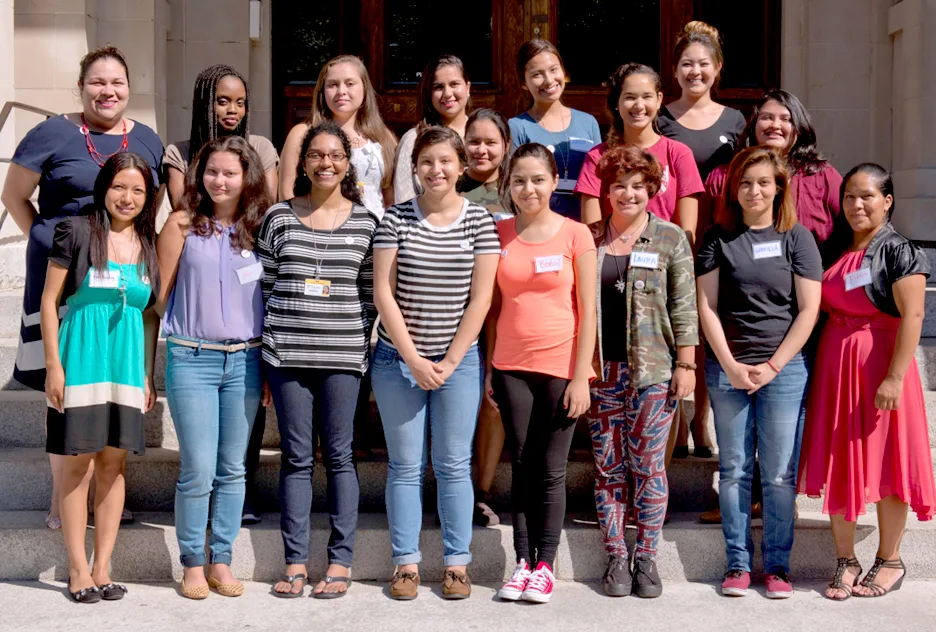
(Trinity’s very first class of Dreamer Scholars August 2014 with Gaby Pacheco, top left)
Read: Washington Post Editorial calling for Congressional Action for Dreamers 1/26/2024
Ten years ago, Trinity enrolled our first class of Dreamer Scholars thanks to TheDream.US that celebrates its tenth anniversary next month. The women in our first class, some of whom are in the photo above, have gone on to amazing careers, have created beautiful families and in every way exemplify Trinity’s values of service and leadership for their communities and our nation.
Unfortunately, the bright promise of the DACA program (Deferred Action for Childhood Arrivals) faded quickly after President Obama left office. President Obama created the program by executive order in 2012. Encouraged by the ugly rhetoric of the succeeding administration, numerous states attorneys general raised legal challenges to DACA with different levels of success. New admissions to the program ended but the Supreme Court and other courts have allowed the original DACA recipients to maintain their status while various challenges continue to wend their way through the legal system. The case that is most likely to set the ultimate precedent is in Texas where a judge ruled DACA illegal (actually, twice) but the order is stayed while appeals are pending.
In cooperation with the Presidents’ Alliance on Higher Education and Immigration, and with TheDream.US, today I participate in a webinar to encourage college and university presidents to join an amicus brief to the U.S. Court of Appeals for the Fifth Circuit urging those judges to overturn the lower court’s finding that DACA is illegal and allowing the program to continue. Trinity has signed onto the amicus brief as we have in the past in similar cases.
Below are the remarks I gave during today’s webinar on this case and the future of DACA:
Higher Education Leaders Must Support DACA and Undocumented Students
Remarks by President Patricia McGuire for the Presidents’ Immigration Alliance Webinar, January 22, 2024
In 2013, when Trinity’s good friend Don Graham called me to say he had an idea about how Trinity could help a very special group of students who were undocumented immigrants in the U.S., I confess I had never heard of DACA and I had a lot of questions about Don’s proposal. Ultimately, Don convinced me that Trinity should be one of the first private university partners to participate in TheDream.US — and the success of Trinity’s Dreamer Scholars across the last 10 years has been fantastic.
Trinity is one of the few remaining historic Catholic women’s colleges in the nation, and so we joined the partnership with a deep sense of commitment to our underlying moral principles of social justice and the dignity of all persons. We are also both a Predominantly Black Institution and a Hispanic Serving Institution. Trinity specializes in women’s education at the undergraduate level and we quickly realized that the undocumented women we welcomed through TheDream.US were absolutely amazing students with blazing ambition, fierce resilience, and a level of fortitude in the face of political and public hostility that most of us could not begin to match.
As we got to know our Dreamer Scholars and other undocumented students, we grew increasingly bewildered about why anyone in this country — any politician, any corporate leader, any academic, any citizen — would NOT want these amazing students to be part of the future of our nation, our economy, our society. Today, more than 10% of Trinity undergraduates are undocumented persons, and we are glad to support them with millions of dollars in Trinity grants and other scholarships funded through TheDream.US and generous benefactors. Trinity provides a large network of support services to Dreamer Scholars who also are effective advocates for their own needs.
The return on our investment in these students is so clear. Since 2014, Trinity has graduated hundreds of Dreamer Scholars — with a retention rate above 90%, most finish in four or five years. Dreamer Scholars at Trinity quickly advanced in student leadership, from leading student government to being team captains and advancing advocacy for many different causes. More than half of our annual inductees into Phi Beta Kappa are Dreamer Scholars, and most graduate with honors. Many go on to graduate school — our recent Dreamer graduates have earned advanced degrees at Duke, Brown, the University of Illinois, the University of Maryland, Trinity, and other universities. They have become teachers, nurses, medical personnel — all professions that have high demand for well-educated workforce — public policy specialists, and vital leaders in state and federal offices. We are so grateful to our partners at TheDream.US for working with us to support these amazing women — so many thanks to the new CEO Gaby Pacheco (a fabulous leader!), former CEO Candy Marshall, team members Hyein Lee and Trinity’s very own Sadhana Singh ’18, a member of our first Dreamer class now working with the program.
The political and legal attacks on DACA and undocumented persons are almost incomprehensible when we consider the history and values of this nation — a nation built by immigrants, a nation forged in the fire of the quest for human rights and freedom. The paradox of the anti-DACA movement is even more bewildering when we consider the more mundane but important calculus of the future of the U.S. economy and workforce. Our nation desperately NEEDS the talent, commitment, and yes, the patriotism of our Dreamer Scholars, the DACA recipients fortunate enough to get in while the program was still open, and the tens of thousands of other undocumented persons who remain excluded from full participation in American life and higher education.
Higher education has suffered many bruises in the last year as well-funded movements seek to curtail our advocacy for students on the margins – our Black and Hispanic students, our LGBTQ students, and yes, our undocumented students. I fear that too many of my fellow presidents are stepping back from the barricades at the very time when we need to rise up upon them and reclaim our voices and rightful leadership positions on behalf of our current and future students and the nation they will serve and lead in the future.
We should be as fierce as our students are in our advocacy for justice for all undocumented students, for equal access for our students to the support they must have to complete their higher education and move into the workforce. We must be champions for the rights of our graduates to have work permits, drivers licenses, and the ability to live in the sunshine, not the shadows. If the architects of this Texas case succeed, the thought that DACA recipients who have work permits today might lose them in the future as they move toward their 30’s and 40’s, building families and communities with their earnings, is simply an unimaginable offense against moral good and simple justice. The injustice of the heinous threat to deny the right to work — the right to earn a decent living and to support a family — this is a deep stain on the American soul.
Let’s call out the cynical use of the law to debilitate good people as the immoral act that it is. Let’s be clear: those who seek a permanent end to DACA and stripping away DACA’s modest grant of legal protections are not about legal hygiene but rather about human oppression. They seek to impose maximum human suffering to send a message that certain people are not welcome here – people who are, largely, Black and Brown, deeply impoverished, people whose only real mistake was believing that their children might have a chance for a better future in the greatest nation on earth.
We must be stronger in our determination to make sure that the small gains won through so much hard work for undoc students across the last decade do not dissipate in the toxic political cauldron of racial and ethnic hatred. We must have hope — HOPE! — that good solutions are still possible, and that the pursuit of the American Dream is not just some outmoded fiction from byegone days. We owe it to our students today and in the future to do all in our power to make The Dream their reality, to empower them to become fully part of this society, using their talents and ambition and creativity to make these United States even more just for future generations.
My brother and sister presidents: please join me in supporting the amicus brief for this case. And by signing on, please reaffirm your commitment to working for a brighter future for our undocumented students.
Below: graduation day for our first Dreamer Scholars in 2018, with Don Graham, Gaby Pacheco and Candy Marshall of TheDream.US and Trinity Board Chair Sr. Pat O’Brien, SND.
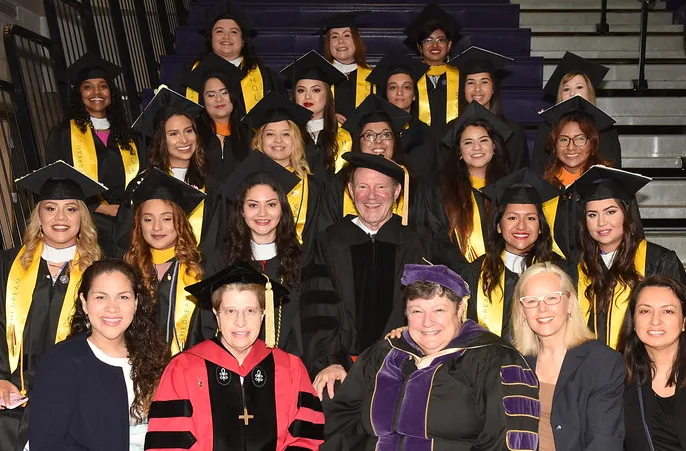
Adonis Mokom ’22 to Trinity Nurses: Believe in Yourselves, Trust Trinity!
January 10, 2024(Enjoy this one-minute video of the Nursing Pinning Ceremony on January 8, 2024)
One of our outstanding Nursing alumnae — Adonis Mokom ’22, BSN, RN — gave the keynote speech at the Nursing Pinning Ceremony on January 8. Adonis is a nurse in the Medical-Surgical Intensive Care Unit at Medstar Washington Hospital Center in Washington D.C.
I asked Adonis if I could share the speech she gave to the new class of Trinity nurses. Here is her speech:
Speech for Pinning Ceremony for Fall 2023
Adonis Mokom ’22, BSN, RN
Good evening, dear faculty, family, friends and soon-to-be nurses, Today, January 8th, 2024, marks the culmination of one journey and the start 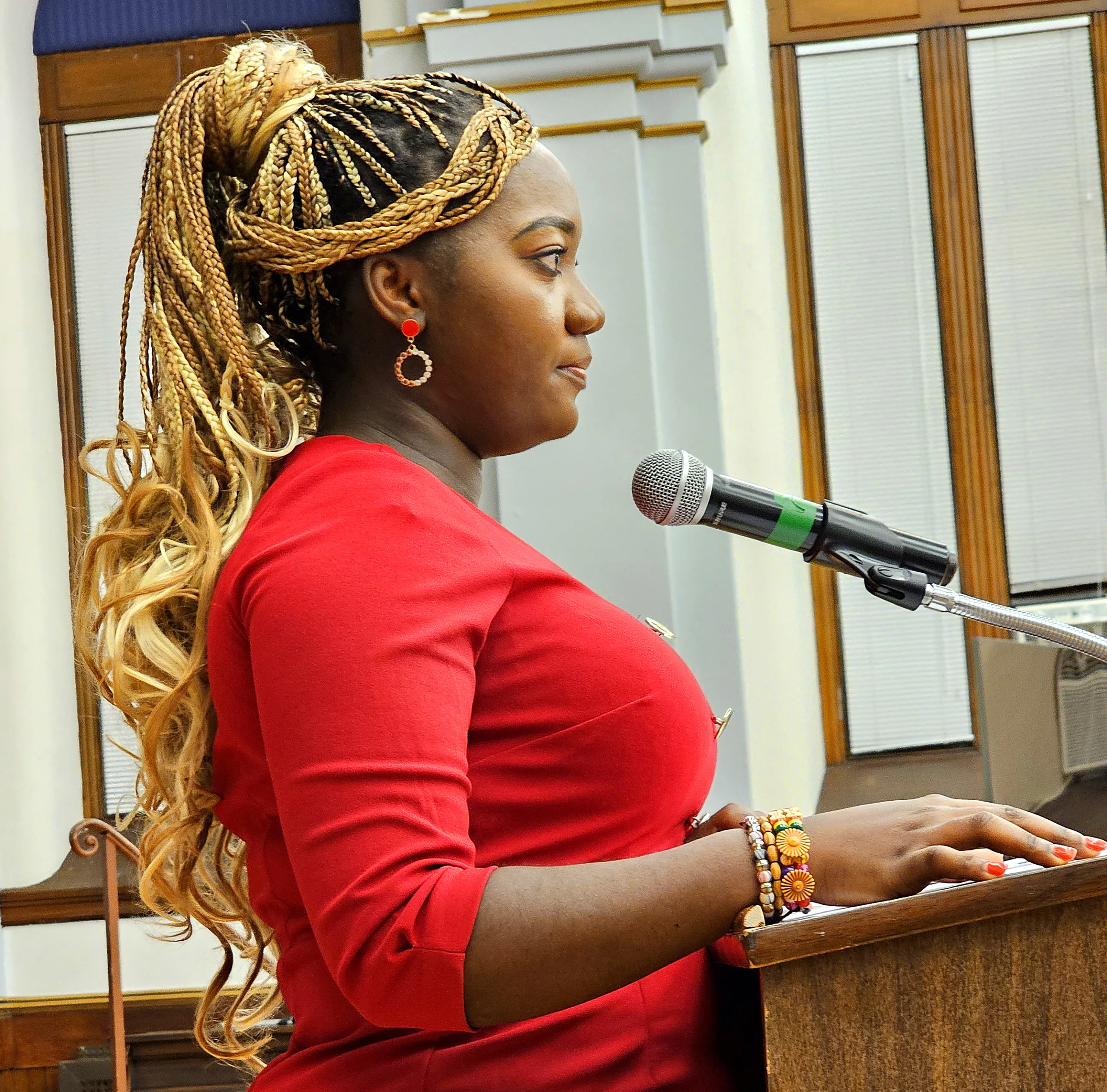 of another. My name is Adonis, and it is a privilege and honor to have been asked to speak at this Pinning Ceremony for the Graduating Class of Fall 2023. I stand before you as once a nursing student, but also as an observer of the hard work and devotion that each of you invested to reach this moment, and I am filled with optimism and hope that those of you here today will take those qualities forward into the nursing field.
of another. My name is Adonis, and it is a privilege and honor to have been asked to speak at this Pinning Ceremony for the Graduating Class of Fall 2023. I stand before you as once a nursing student, but also as an observer of the hard work and devotion that each of you invested to reach this moment, and I am filled with optimism and hope that those of you here today will take those qualities forward into the nursing field.
Let’s take a few minutes to travel down memory lane to the first day in your first nursing class, be it foundation or health assessment. Remember the joy you felt and the wonderful feeling of wearing the Trinity nursing scrubs while learning about your first head-to-toe assessment. The excitement, anxiousness, and fear but yet a wonderful feeling of having made it this far was all I thought about even totally forgetting about how difficult and challenging the journey ahead was (especially the exams – hahaha). I totally felt the same way.
But you have made it so far, despite the rigorous work, lengthy study nights, the disappointment from not receiving the grades you expected, and the headaches — but you overcame all of them. You endured 4 semesters of nursing school, beginning from the introduction of nursing skills and the nursing process in Foundation of Nursing course, to learning about how to thoroughly conduct a head-to-toe assessment in health assessment, and the hard work to create and study 300 medications and their classes in pharmacology. A journey further into more challenges, which involved understanding the various diseases and combining your knowledge from pharmacology class about medications that are used to treat or manage the care for patients with those diseases. But you were strong enough to make it through successfully, even to the Capstone course to which you brought all the knowledge learned and skills from all your courses throughout nursing school during weekly tests in order to prepare for the VATI. Now to the present: you are successfully seated at your Pinning ceremony here after receiving the green light. WOW. You all made it through because you believed in yourself.
 The next step of your journey is the NCLEX, which is the Nursing Licensure Examination needed to practice as a Registered Nurse. You may feel like it’s too much to handle, very anxious, or even overwhelmed by the thought of how to start studying for it or even what to expect. It is all normal because I felt the same way while studying for and taking the NCLEX. But during those difficult moments, I would constantly reflect on the words of Dr. O’Reilly and other nursing professors: “You should believe in yourself, in your skills, trust that Trinity has prepared you well, and use all that you have learned to diligently answer each question.” Truth be told, those words are 100% true, despite not constantly feeling like I was ready, but I took my NCLEX 3 weeks after graduation from Trinity and felt excited and confident because I knew I am a graduate of Trinity Washington University and I would succeed.
The next step of your journey is the NCLEX, which is the Nursing Licensure Examination needed to practice as a Registered Nurse. You may feel like it’s too much to handle, very anxious, or even overwhelmed by the thought of how to start studying for it or even what to expect. It is all normal because I felt the same way while studying for and taking the NCLEX. But during those difficult moments, I would constantly reflect on the words of Dr. O’Reilly and other nursing professors: “You should believe in yourself, in your skills, trust that Trinity has prepared you well, and use all that you have learned to diligently answer each question.” Truth be told, those words are 100% true, despite not constantly feeling like I was ready, but I took my NCLEX 3 weeks after graduation from Trinity and felt excited and confident because I knew I am a graduate of Trinity Washington University and I would succeed.
Secondly, you all are graduates of Trinity Washington University, and all the faculty, your family, and friends are constantly cheering, praying, and belief in you, so don’t doubt yourself even for a second. Utilize the same belief even when starting your first nursing job. I believe some of the nursing graduates here have already accepted job offers or are still deciding on a specialty. It could be the specialty you enjoyed during your nursing clinicals or by taking the course. I had an offer to a Medsurg unit, IMC (ICU step-down), and patiently waited for a response or an offer for an ICU position. One lesson I learned during the process is “delayed doesn’t imply denied” — reach out to those facilities and advocate for yourself. It could sound very confident, but be flexible and have a positive and open mindset to learn.
Thirdly, remember you are all transitioning from a nursing graduate to a licensed RN position, and you will face more challenges, but turn to your left and right . While asking yourself, “What support do I have available?” it could be your preceptor, managers, nursing director, educators, other experienced nurses and even your fellow colleagues in residency. I accepted a job in a Medical-Surgical Intensive care unit (ICU) at one of the best hospitals here in Washington D.C. It felt surreal at the beginning because there was either an excitement component or an increased fear of being a brand new nurse stepping into the ICU (which was described as the “Lion’s den”). OR maybe it could have been the “imposter syndrome”. The Webster dictionary defines it as “persistent doubt concerning one’s abilities or accomplishments accompanied by fear despite evidence of ongoing success”.
Nursing is a very challenging profession but at the same time, a rewarding one. The rigorous and lengthy 12-hour shift providing care for both the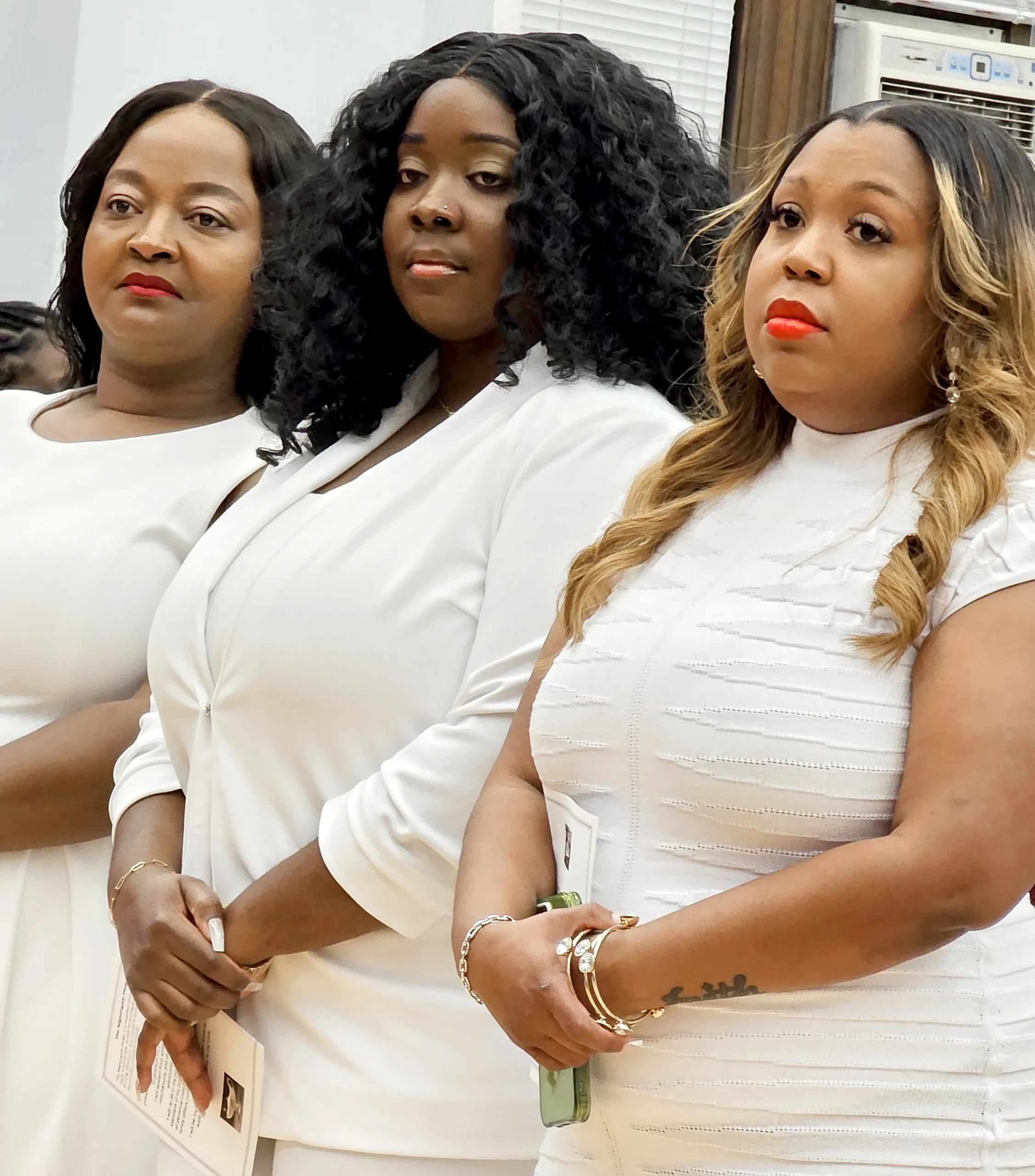 patients, their support system, and effectively maintaining active communication with all members involved in the interdisciplinary care for the patient. It is not all about the medication or the education provided to the patient and their families, but it’s beyond the care you provide deep down from your heart. Through active listening, while using either verbal or nonverbal cues to advocate for the patient and put them first always.
patients, their support system, and effectively maintaining active communication with all members involved in the interdisciplinary care for the patient. It is not all about the medication or the education provided to the patient and their families, but it’s beyond the care you provide deep down from your heart. Through active listening, while using either verbal or nonverbal cues to advocate for the patient and put them first always.
I remember my first week off orientation in the ICU and walking into my patient room who was extubated (which means they previously couldn’t breathe on their own and needed ventilator support). Just listening to the joy expressed by the patient who had been intubated twice and their vacation plans after leaving the hospital. A few minutes later, stepping away to get a warm blanket and returning to see my patient’s appearance which portrayed fear, anxiety, and loss of hope because of their intent to move towards end-of-life care at home. That was one of the scariest moments of my life. The lesson I learned from this scenario is that nursing is very unpredictable and cannot be fully understood, but your patient comes first. You will be faced with moments in which you will engage, advocate, and facilitate difficult conversations such as end-of-life wishes and care but remember you have a duty to make every patient encounter the best memorable experience, even through the little things such as dancing or singing.
Finally, when preparing this speech, I thought a lot about how the message from my speech would be beneficial to the nursing graduating class and support their transition to nursing practice at the bedside. I arrived at a few conclusions: Always put your patients first, either through your care or advocating for them, even if it entails walking up to the attending physician. Secondly, nursing will test your resilience, and take care of yourself, it is ok to step away for a few minutes when feeling overwhelmed. Reflect on the words of wisdom from the Trinity Nursing Professors, “When in doubt, don’t assume but seek out the support around you because nursing is a teamwork.” And remember, you are a Trinity Nursing graduate, strong enough to overcome anything and you are never alone. Congratulations once again to the Trinity Nursing Graduating Class of Fall 2023.
